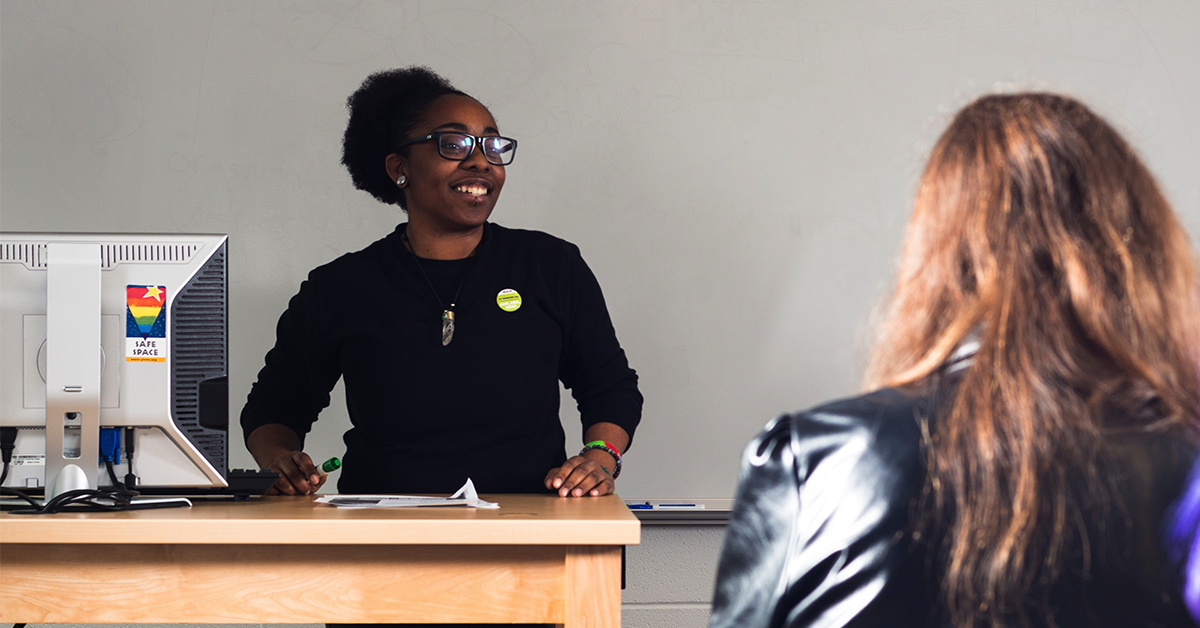Educators Shouldn’t Face Pushback for Displaying LGBTQ-Affirming Signs of S

Educators across the country are reporting pushback for displaying LGBTQ-supportive materials, such as GLSEN’s Safe Space Sticker, in their classrooms. It is important that this be addressed, and that everyone involved in the school community--from administrators to family members--understand the importance of these seemingly small symbols of support.
GLSEN’s Safe Space Kit materials have been curated to equip educators with the information and resources they need in order to best support and understand LGBTQ students in their schools. The posters and stickers within the kit specifically aim to increase educators’ capacity to be a visible ally and support to LGBTQ students on an interpersonal level. In the Safe Space Kit guide, educators are reminded, “One of the most important parts of being an ally to LGBTQ students is making yourself known as an ally. In order to come to you for help, students need to be able to recognize you as an ally.”
According to GLSEN’s latest National School Climate Survey, which reports on the experiences of LGBTQ young people in schools, nearly 9 in 10 LGBTQ students were harassed or assaulted at school. Allies can play a critical role in identifying the bullying and exclusion of LGBTQ students, and some of the most important allies are educators. Holding the dual position of controlling classroom environments, and often having a voice to advocate on LGBTQ students’ behalf to school administration, educators maintain an invaluable role in creating positive learning environments. They are also the direct actors in implementing LGBTQ content in class curricula or serving as a faculty advisor for students to formally organize supportive groups on campus.
One of the most integral parts of educators acting as allies is making themselves known as allies. GLSEN’s research shows that, even if students do not approach publicly allied teachers, just knowing that they have them as a support system in the school can have positive educational outcomes for LGBTQ students. When educators display LGBTQ-affirming stickers or posters in their classrooms, there are a variety of positive effects for LGBTQ students. Our research shows that students who had seen a Safe Space sticker or poster in their school were more likely to identify school staff who were supportive of LGBTQ students and more likely to feel comfortable talking with school staff about LGBTQ issues. Having supportive staff is a tremendous support for LGBTQ youth.
Looking at students with 11 or more supportive staff members, versus those without any supportive staff members, students with this level of support were less likely to feel unsafe (40.6% vs. 78.7%), less likely to miss school because they felt unsafe or uncomfortable (16.9% vs. 47.2%), had higher GPAs (3.3 vs. 2.8), and were less likely to say they might not graduate high school (1.7% vs. 9.5%). Overall, students who had supportive staff by their side reported higher perceptions of safety and overall academic performance, creating a better school environment for all.
In order for these students to feel safer in our schools and reach their full potential, they need to know that we see and support them in their entirety. Allowing educators to be visible in their allyship towards LGBTQ students is an imperative support to ensure that all students have an affirming learning environment. Bringing GLSEN’s Safe Space Stickers to schools is just the first step in establishing trust with students, letting them know that educators are there for them, and that they belong.
Becca Mui is GLSEN’s Education Manager.
